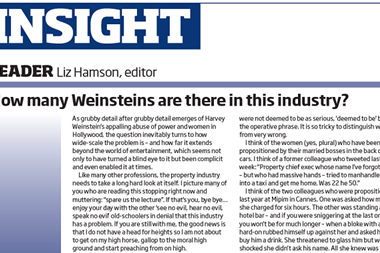This week, we heard the grim Bank of England forecast that 75,000 finance jobs could be lost as a result of Brexit.

With London’s prospects in particular ‘clouded by Brexit’, it is little wonder investors are growing ever more interested in long-let property. Who wouldn’t want to own assets that allow them to look beyond the challenges of the next few years with a degree of security?
In a low-interest-rate environment, long-let property offers a decent level of income for pension funds and private investors alike. Aviva Investors has already tapped into the trend successfully with its Lime Property Fund and, as we reveal this week, it is looking to replicate that success in the listed sector.
As one of the biggest investors in UK commercial property, Aviva’s first foray into the REIT world will be closely watched.
In the past year, a range of other long-income REITs have launched. It is arguably evidence of the UK REIT regime delivering on the objectives laid out when it was introduced 10 years ago - to encourage wider ownership of UK real estate and stem the flow of investment offshore.
However, investors in some of these new vehicles could end up disappointed. For starters, the value of long-income property is riding high because of the low-interest-rate environment, so as interest rates start to rise, there is only one way for values to go.
Furthermore, respected industry figures have raised the alarm about the impact intense competition is having on pricing.
We are now in a world where it is easier to raise money than invest it wisely - Martin Moore, Secure Income REIT
In Secure Income REIT’s latest results, its chairman Martin Moore said: “With myriad new long-income vehicles coming to market, we are now in a world where, in our judgement, it is easier to raise money than invest it wisely.
“In the rush to build up portfolios, we now regularly see buyers loosening their criteria in order to secure deals.”
The biggest danger is that buyers searching for extra yield will take more risks than they should. Just because leases are long, it doesn’t mean investments are necessarily safe. Tenants can go bust and even if they don’t, they could quit at the end of the lease, leaving the owner with a potentially worthless property if no replacement tenant can be found.
Aviva is well placed to avoid these pitfalls. It has plenty of experience to bring to bear - its Lime fund was launched in 2004. However, some buyers will probably make investments they come to regret, so let’s not talk about long-income property as being as safe as government-backed bonds. Remember when securitisation was dressed up as the guaranteed return of the century. It sent the world into the biggest recession since the 1930s…
Dark matter
We make no apologies for returning to the issue of sexual harassment in the industry for the third time in as many weeks. The Weinstein scandal has not so much triggered a ripple effect as a tsunami.
The fear is that in the corporate world, the property fraternity - for it is a fraternity - has a more serious problem than most.
After all, this is all about men in power - and with great power comes great irresponsibility, it seems. However, I am heartened that people are talking about the problem finally and, more importantly, calling for action. The journey is going to be long and difficult, but it will be worth it.





























No comments yet